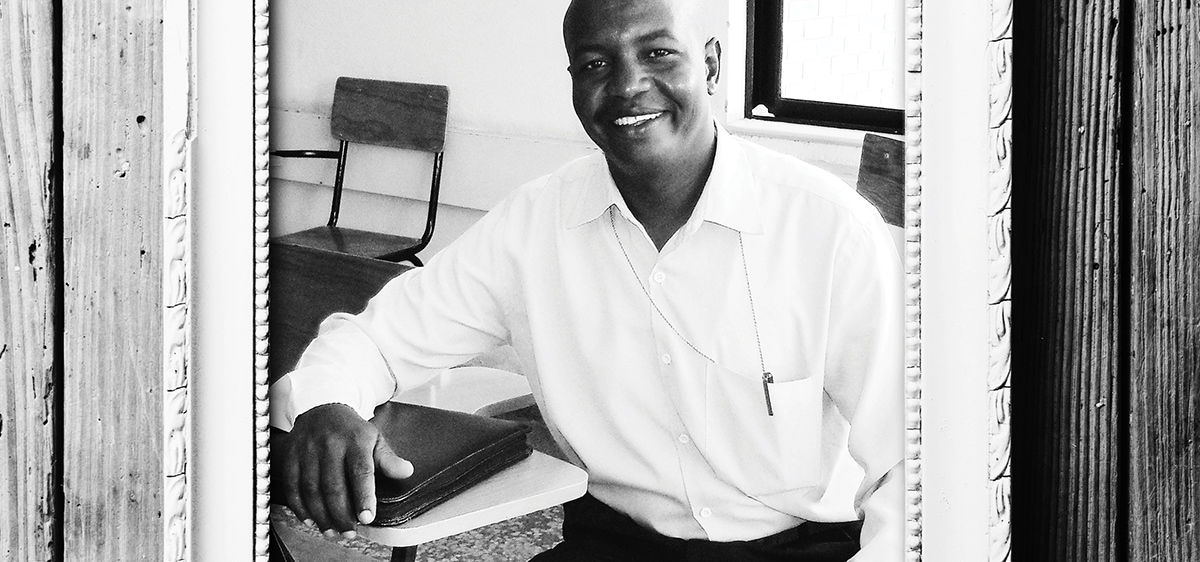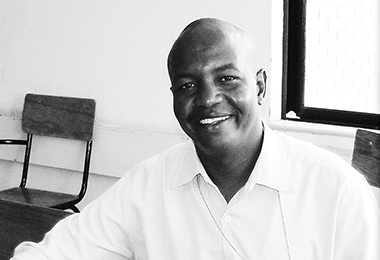[vc_row][vc_column][vc_column_text]

[/vc_column_text][/vc_column][/vc_row][vc_row el_class=”hero-header-text”][vc_column][vc_column_text]
Peace at Any Cost
Remembering Pastor John Kiruga’s Courageous Journey
By John Kiruga | Introduction by David Husby | November 21, 2016
[/vc_column_text][/vc_column][/vc_row][vc_row][vc_column][vc_column_text]
When Pastor John Kiruga, the recently elected president of the Covenant Church of Kenya, heard that I would be in Nairobi this past April, he asked to meet with me. That day he spoke to me for four hours about his passion for peace building in Kenya. I had known Pastor John for more than seven years, but until then I hadn’t been aware of his journey to become a peace builder. After our meeting, he submitted a grant application to Covenant World Relief to work with Muslim community leaders in the northern Kenya towns of Garrisa and Mandera to build peace.
Garrisa was where Al-Shabaab militants had entered the University of Garrisa one year earlier. They took 700 hundred students hostage, then proceeded to kill 148 students who identified themselves as Christians.
Three weeks after John’s grant application was approved, I received an email from him with a brief update on the project: “We had a very good peace seminar yesterday. Heading to Mandera tomorrow. Pray for us. Pray for Kenya. More details next week….Mandera is not that safe for now, but we must preach peace at all cost.”
Two days later we received the news that John had been killed by gunmen shortly after he began his journey from Mandera by bus back to Nairobi. The cost of preaching peace was his life. Peace be to his memory. —David Husby
[/vc_column_text][vc_separator][/vc_column][/vc_row][vc_row][vc_column][vc_column_text]
I was born and raised in a nominal Christian family in Kenya. When I was twelve my father gave his life to Jesus. After that we started going to church as
a family.
But when I became a teenager I stopped going to church and got involved in activities that were not very godly. After high school I attended a technical school in the city where my father was residing and he encouraged me to join him in church. I saw that it was better not to ignore him, but my heart was not in it.
Later I met some young people who were so loving and encouraging to me and they started preaching to me. Just as I was finishing my two-year degree, I received Jesus as my Savior. I was twenty years old. I was very happy and I joined the choir, and I became a vocalist in the church and a youth leader.
I got a job in the city of Mombasa in an area that was predominantly Muslim. I did not want to go there. I felt that I could not work for a Muslim. I thought that Muslims hated Christians. I even thought God did not love them.
But I found a church there and I started attending. Four years later, in 1998, we started the Evangelical Covenant Church in Mombasa.
When the church leaders suggested I plant a church on Lamu Island, an area that was 99 percent Muslim, I resisted. But we prayed and I heard from God. So in 2002 I went there with my wife and son to plant a church.
A Slow Start
We focused only on those who came from Christian backgrounds. Muslims in the area attacked us, denied us access to premises where we could worship, and threatened us. My attitude toward them became even more hostile. The church grew slowly.
Then I got to know a Methodist pastor who had a unique ministry. He was involved with secret believers in Christ who came from Muslim backgrounds. He appreciated my work, and he asked me to mentor two young men who were believers.
I agreed, and one day I tried to go with one young man to his home—only to meet his mother there. She thought it was because of me that her son had left the Islamic faith. She chased me away, and I did not dare to enter that compound again. Instead, the young man and I met in secret.
There was a well-known but feared witch doctor on the island. His wife was very sick, and he invited me to his home to pray for her. He was Muslim and he said terrible things about the Christian faith, but he believed that Jesus was a healer so I went to him when he asked. We shared a meal together, and after I prayed for the woman, she stood up, though she was very weak, and started walking. She had been bedridden for two weeks. That day the man and his wife accepted the Lord.
In 2004 I went to Mpeketoni, an area where many Christians had migrated. The Muslims and traditionalists who lived there engaged in debates with the Christians. I listened to some of those debates and I became very bitter about how Christianity was critiqued. I wanted to counter the arguments against Christianity, so I organized church leaders to receive training in apologetics. Eventually our retorts ended the debates in the open market.
Preaching in Secret
I started preaching in secret to Muslims, and many came to me for help. Some came to Christ and we baptized them. I witnessed the persecution those believers experienced when they disclosed their identity to their community. Sometimes we hid them in our home when they had to flee from their families.
That’s when God revealed to me that we needed to move beyond debates and arguments. We had to start preaching the gospel of peace.
I was motivated by friends who were working among Muslim communities in Kenya and Tanzania. When I heard their stories I started evaluating our approach and considering how Jesus engaged other people. I noticed in the Bible how Jesus established his kingdom through dialogue. The most important thing seemed to be his gospel of peace.
As I prayed about what to do, God pointed me to the Waata people, a very small group of Muslims who are viewed as cursed and inferior by other communities. As nomadic people—hunters and gatherers—they have been dispossessed of their land, stripped of their rights, and they live in very harsh conditions. Very few have traveled in search of jobs, and often the best work they can find is being a watchman at someone’s gate. Marrying a Waata is considered taboo by other communities.
The Waata people are waiting for us to bring hope and peace and to be reconciled to others. They are isolated. They have no access to education or health facilities. My question is, why should this happen?
Hope for Waata People
Last year a friend and I decided to share our love with children of the Waata community.
Our first visit was to establish a relationship that could help us learn about their day-to-day life. We visited several villages, and I decided to settle in two villages. We would pray that God would transform these communities.
Children in the villages eat only once a day. Some walk around naked because they don’t have clothes to wear. When their parents look for water and wild fruits in the forest, they risk being attacked by wild animals. The villages don’t have a school, not even a kindergarten, so children must travel to the next village of the Pokomo tribe more than five kilometers away to go to school. But their route is treacherous, and they must wait until they are old enough to run for their lives if they encounter wild animals like buffaloes and hippopotamus along the way. So they do not start school until they are ten years old. Girls are married off when they are sixteen or eighteen, which means they get married before they can even complete primary school.
Where I was born, peacemaking was based on family values and tribal competitions. Those who did not fit in could be discriminated against, alienated, and even cursed. We see family conflicts in the Bible from the very beginning. Cain and Abel’s conflict was fueled by jealousy that quickly led to brutality and murder (Genesis 4:1-16). Unresolved conflict destroys relationships and increases alienation, creating a gulf between the hated and the haters, the poor and the rich, the religious right and the religious wrongs, elites and uneducated, between tribes, races and ethnicities, Muslims and Christians, and so on. The divisions have continued. Now we need peace at all cost.
When I was contending for my faith through arguments and debate, I was lost. I forgot that God calls us to preach the gospel of peace.
In 2 Corinthians 5:17-20, God calls us the ambassadors of Jesus in the world. Ambassadors represent their sending countries with honor and strive for affable and good relationships between the two countries. They are a government in that hosting country.
The ministry we are given in this world is to reconcile, mending ways where relationships have been broken. As with the prodigal son, God spreads his arms wide to receive us even if we have squandered what was precious. And in response, we rejoice with others by extending mercy and justice to those who are passing through difficult times, by welcoming them to the fold as the sons and daughters of Abraham.
[/vc_column_text][/vc_column][/vc_row]














